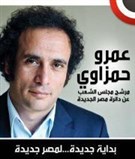Yasser Borhami
Yasser Hussein Borhami is a prominent Salafist preacher and deputy leader of Al-Daawa Movement (Al-Da‘waa Al-Salafiyyai), a Salafist movement that spawned Al-Nour Party in 2011. Borhami was born in 1958 in Kafr Al-Dawar in the northern governorate of Beheira, and his father, a member of the Muslim Brotherhood (MB), was imprisoned under Nasser in 1965.
Borhami graduated from Alexandria University with a degree in medicine in 1982 and earned a master’s degree in pediatrics in 1992. He went on to obtain a degree in shari’a from Al-Azhar University in 1999. Borhami authored several books on religion such as, No God but Allah is the Saving Word.
As a university student, Borhami was active in Salafist circles, and was affiliated with al-Gamaa al-Islamiya (the Islamic Group). While on pilgrimage in Mecca during his second year of college, Borhami met the late Abdel Aziz bin Baz, a prominent Saudi Islamic scholar, who greatly influenced Borhami’s thinking about religion.
Many Salafist figures were arrested in 1980 during President Anwar Sadat’s crackdown against major opposition forces, and their absence from the scene catapulted Borhami into the public sphere. In 1987, he was detained for a month in connection with the attempt on the life of Interior Minister Hassan Abu Basha.
Before the Revolution
Before the January 25 Revolution, Borhami was a prominent preacher and key figure in Al-Daawa Movement. Al-Daawa was founded in 1984. The state disbanded the movement in 1994, and many of its key members were arrested.
Borhami is often hailed as a prominent scholar of puritan Islam. However, he was criticized for his attempts to calm down public uproar over the death of Salafist activist Sayed Belal in the custody of State Security Services in early January 2011. Belal, who was arrested in connection with a church bombing in Alexandria in December 2010, was reportedly tortured to death while in police custody. While non-Islamist groups like April 6 movement blamed Egyptian authorities for Belal’s death and called for punishing those responsible, Borhami, to the disappointment of disgruntled Salafist activists, asked followers to “be patient” and exercise restraint.
The Revolution and Beyond
When asked if it was sinful to participate in the protests called for 25 January, Borhami said that participation was not a religious sin but that Muslims were advised not to participate.
Although Borhami discouraged political participation before Mubarak’s ouster, he was instrumental in forming Al-Nour Party in 2011, commonly viewed today as Al-Daawa’s political arm. In justifying the shift in his position, Borhami said, “Islam must become involved of all aspects of life, even the political, and the Islamic movement must unite.”
Last July, Borhami supported a SCAF-issued statement calling for a halt to public demonstrations so as to avoid chaos and instability.
Borhami is backing Al-Nour Party’s candidates for the 2011/2012 elections, and regularly speaks at their rallies.
Prior to the 2011 election season, Borhami held the view that women should not serve in parliament. After the inclusion of women on electoral lists became a legal requirement, however, he justified Al-Nour Party’s decision to field women candidates as a necessary step to ensure that the party could win as many seats in parliament as possible. Al-Nour Party officials assure that female candidates would remain in the tail of their electoral lists and, thus, will have a very little chance of securing representation. Borhami attended and spoke at Al-Nour’s first women conference, which the party organized to enhance its outreach to female supporters and potential supporters. The party’s detractors, however, cynically mocked this initiative, pointing out that none of the speakers at the event were women, but rather a handful of old men lecturing female attendees about the nature and scope of their political rights.
[Developed in partnership with Ahram Online.]
From Jadaliyya Editors:
For more on Egypt Elections Watch (EEW) entries by category, click on the following links:
(1) Parties and Movements
(2) Actors and Figures
(3) Laws and Processes
To view all entries on one page, click on Egypt Elections Watch, and for EEW team members click here. Our Egypt Page can always be accessed view here.
![[Yasser Borhami. Image from civicegypt.org]](https://kms.jadaliyya.com/Images/357x383xo/YasserBorhami.jpg)





